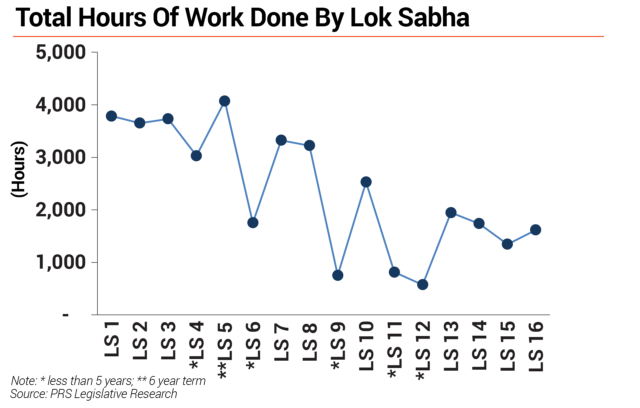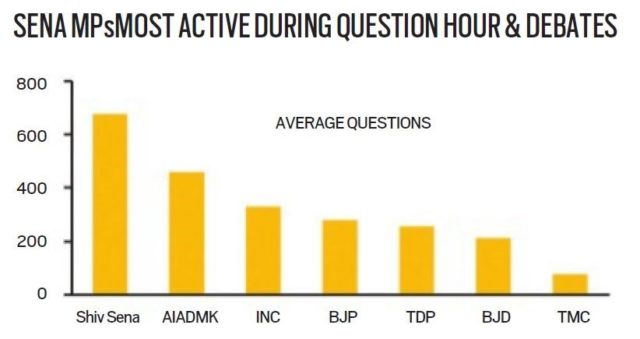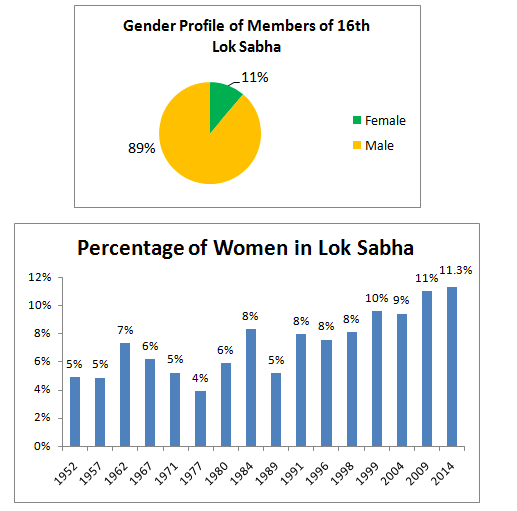PREVIOUS
16th Lok Sabha
February 19 , 2019
2490 days
15076
0
An Introduction
- 16th Lok Sabha concluded with its last session on 13 February 2019.
- The 16th Lok Sabha held its sessions between June 2014 to February 2019.
- During the 16th Lok Sabha, 133 Bills were passed and 45 Ordinances were promulgated.
- There were 219 bills introduced, while 203 bills were passed.
- Last session passed the Banning of Unregulated Deposit Schemes Bill-2018 and the Jalianwala Bagh National Memorial (Amendment) Bill.
- The Bharatiya Janata Party (of the NDA) achieved an absolute majority with 282 seats out of 543, 166 more than previous 15th Lok Sabha.
- There is no leader of the opposition in the 16th Lok Sabha as the Indian Parliament rules state that a party in the Lok Sabha must have at least 10% of total seats (545) in order to be considered the opposition party.
- The Indian National Congress (of the UPA) could only manage 44 seats while the All India Anna Dravida Munnetra Kazhagam party from Tamil Nadu came third with 37 seats.
- Mallikarjun Kharge has been declared the leader of the Indian National Congress in the Lok Sabha.
- Almost after three decades it is a full majority government with 282 Seats.
- This Lok Sabha consist the highest number of Women MPs (62), out of which 44 are first-time MPs.
- For the first time maximum number of women Ministers are in the Cabinet and two women ministers in the Cabinet Committee on Security.
- In the 16th Lok Sabha, a no-confidence motion was moved against the government and discussed in the Monsoon Session of 2018 on July 20.
- This was the 27th time a no-confidence motion was discussed since the first Lok Sabha.
Work hours
- The Lok Sabha sat in 18 sessions since June 2014.
- It had the second-lowest number of total hours of work done by any full-term government at 1,615 hours.
- The only worse full-term Lok Sabha was the 15th Lok Sabha where its scheduled time was lost due to disruptions.
- 16th Lok Sabha’s working hours were also 40 percent lower than the average of all full-term governments.
- It sat for 331 days. On average, full-term Lok Sabhas sat for 468 days.
- It also had the second-highest amount of its time spent on legislative business compared to all previous governments.
- Only the first Lok Sabha, constituted in 1952, spent more time discussing legislation.
- Lok Sabha spent 32% of its times on legislative business, above the 25% average.
- It passed 180 bills—only one higher than the previous United Progressive Alliance-led government.
- Of the 180 bills passed, 47 were budget related and 133 were other bills which is 15 % higher than previous Loksabha.

- In the 16th Lok Sabha, 25% of the Bills introduced were referred to Committees, much lower than 71% and 60% in the 15th and 14th Lok Sabha respectively.
Some important Bills passed by 16th Lok sabha
- Black Money (Undisclosed Foreign Income and Assets) and Imposition of Tax Bill, 2015;
- Juvenile Justice (Care and Protection of Children) Bill, 2015;
- Insolvency and Bankruptcy Code, 2016;
- Benami Transactions (Prohibition) Amendment Bill, 2016;
- Constitution (101st Amendment) Bill, 2016 regarding introduction of the GST
- Integrated Goods and Services Tax Bill, 2017;
- Aadhaar (Delivery of Financial and other Subsidies, Benefits and Services) Bill, 2016;
- Mental Healthcare Bill, 2017;
- Constitution (102nd Amendment) Bill, 2018 regarding constitution of the National Commission for Backward Classes under the newly inserted article 338 B of the Constitution;
- Fugitive Economic Offender Bill, 2018;
- Scheduled Castes and the Scheduled Tribes (Prevention of Atrocities) Amendment Bill, 2018 and
- 103rd Constitution (Amendment) Bill.

The following bills have lapsed
- Citizenship (Amendment) Bill - 2019
- Muslim Women (Protection of Rights on Marriage) Bill-2018 aka triple talaq.
- The National Medical Commission Bill,
- Consumer Protection Bill,
- Motor Vehicles Bill, and
- Trafficking Bill
Budget
- 16th Lok Sabha passed 83% percent of the budget without discussion.
- 17% of the budget was discussed in the 16th Lok Sabha, higher than the previous two Lok Sabhas.
- In budget session 2018-19, 100% of demands were passed without discussion.
- This also happened in 2004-05 and 2013-14 during the 14th and 15th Lok Sabha respectively.
Background - Members
- Among parties that had over 10 Parliamentarians, Shiv Sena members asked the highest number of questions and also participated in the highest number of debates.
- Compared to the 15th Lok Sabha, there is an increase of members with criminal cases.
- In 2009, 158 (30%) of the 521 members analysed had criminal cases, of which 77 (15%) had serious criminal cases.
- At present out of the 542 members analysed, 443 (82%) are having assets of Rs.1 crore or more.
- In the 15th Lok Sabha, out of 521 members analysed, only 300 (58%) members had assets of Rs.1 crore or more.

Age Profile - Members
- 253 of the 543 (47%) MPs elected to the 16th Lok Sabha are over the age of 55.
- In the 15th Lok Sabha, the percentage of MPs over the age of 55 was 43%.
- This is the largest number of MPs to be elected to the Lok Sabha who are above the age of 55 in the history of the country.

- Only 71 MPs (13%) have been elected to the Lok Sabha in the last election (2014) who happen to be under the age of 40.
Gender
- In the 16th Lok Sabha, of the 543 MPs elected, 62 are women.
- This is the highest number of women MPs elected to the Lok Sabha in the history of the country.

- Only 12.45 percent of Parliamentarians in the 16th Lok Sabha were female.
- 58 women were elected to the 15th Lok Sabha in the 2009 general elections.

- On an average, women MPs asked 292 questions, slightly lower than the male average of 302.
Education Profile - Members
- 75% of the MPs elected in the 2014 general elections have at least a graduate degree.
- This is slightly lesser than the 15th Lok Sabha in which 79% of MPs held at least a graduate degree.

- At the same time, the number of MPs with just a matriculate degree has decreased in the 16th Lok Sabha to 10% from 17% in the 15th Lok Sabha.
- The number of Members with a doctoral degree has also increased in the 16th Lok Sabha to 6% from mere 3% in the 15th Lok Sabha.
Professional Profile
- In the 16th Lok Sabha, 27% of MPs elected have listed agriculture as their primary occupation, followed by political and social work (24%) and business (20%).

- If we compare this with the 15th Lok Sabha, we find that 28% MPs had listed political and social work as their occupation, 27% had listed agriculture, while 15% had listed business.
- Going back to the very first Lok Sabha that was formed in 1952, we find that the single largest occupation of Members was that of lawyers (36%), followed by agriculture (22%) and business (12%).
- - - - - - - - - - - - - - -
Leave a Reply
Your Comment is awaiting moderation.


